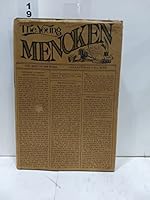- Series
- | Authors
- | Book Release Calendar
- | Search |
- Genres
- | Newsletter
- Welcome to FictionDB, Guest
- | My Account
- | Help

The Young Mencken — Carl Bode
buy the book from amazon
Paperback editions:
Hardcover editions:
eBook editions:
Audio editions:
Large Print editions:
Description
and covered with with the inevitable debris that the passing decades bring. Yet there
is a timeliness, as well as a novelty for us, in much that he wrote during his most ebullient period.
The best that he wrote is surely worth reviving, whether it is by an unknown Mencken or by a Mencken we know, such as the witty, opinionated critic or the raucous disturber of the peace. In a sense nearly everything in the pages that follow is fresh, has not appeared in a book before -from the initial poem, first printed in
the summer of 1896 when he was a schoolboy, to the final essay, which went into type in the autumn of 1917 when he had reached the peak of his powers. He reworked a few of these texts afterward,
for "The Sahara of the Bozart" for instance, and unquestionably made improvements.
But what we have here are preeminently the first fruits.
Today we have worn thin the word 'relevance," yet much of what Mencken published then is relevant now. The tides are running his way again. His very prejudices look current ; his essential attitudes pulse with new life. What he asserts in The American in particular is what the ghetto militant is asserting, with the difference that Mencken's weapon is wit while the militant's
is shock rhetoric. The fact is that Mencken has a message for us. But there is more
to it than that. Beyond the timeliness and relevance lies some superb reading for its own sake. Mencken writes like a combination of angel and baggy-pants comic. Even his early work shows the flavor of his brash, brilliant personality. He began as a reporter, so some of that work is reportage ; but he grew into the best journalist who ever hunched over a typewriter. And here we
can watch him growing.
CERTAIN CONTENT THAT APPEARS ON THIS PAGE COMES FROM AMAZON. THIS CONTENT IS PROVIDED ‘AS IS’ AND IS SUBJECT TO CHANGE OR REMOVAL AT ANY TIME.

 Amazon UK
Amazon UK